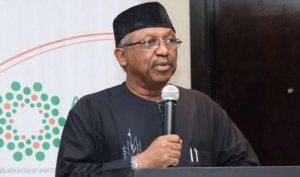Expert Canvasses Multi-sectoral Approach In Financing Healthcare In Nigeria

By Fatima Mohammed-Lawal
Dr Gafar Alawode, the Programme Director of DGI Consult Ltd. has called for multisectoral approach in financing healthcare for the vulnerable and poor in Nigeria.
Alawode made the call in Ilorin while presenting a paper entitled: “The Abuja Declaration and Healthcare Financing in Nigeria: Perspective, Reality and Prospect”.
The programme was part of activities marking the Annual General Meeting and Inaugural of Sir Ademola Aderibigbe Scientific Conference 2022, organised by Association of Resident Doctors, University of Ilorin (ARD-UITH).
According to him, Multisectoral approach refers to deliberate collaboration among various stakeholder groups to jointly achieve a policy outcome.
He lamented that health sector has not received its deserved attention from the political class as health rarely features among key policy thrusts of government at the highest level.
Alawode pointed out that beyond spending more on health, policy thrusts around improved efficiency of spending and enhanced quality of health care should be high on the governance agenda.
He stated that financing health remains a major constrain in health sector, adding that it now becomes necessary to explore other avenues and look elsewhere for financing of the healthcare needs of the nation.
The expert advocated external financing from donors, and subsidization of healthcare for the vulnerable and indigent.
Alawode suggested that health financing can be derived from pro-Health taxes, the diaspora funds and partnerships with private sector.
He stressed the need for Multisectoral engagement and collaborations that will be based on commitment and ownership.
“There is need to develop a robust accountability framework to monitor innovative financing mechanism.
“It is important to deploy technology driven ways to prevent any irregularities in the health sector such as absenteeism, issue of ghost workers and misappropriation of funds.
“Apart from a ghost workforce, absenteeism, low productivity and distribution that is skewed in favour of the urban at the expense of rural areas, where the burden of disease could be worse, are part of the problems that contribute to inefficiency in health sector spending.
“The existing effort geared towards enhancing transparency and accountability in health workforce management should be brought to the notice of the political class,” he said.
Dr Ade Faponle, a Consultant Nephrologist, at Zenith Medical and Kidney Centre, Abuja, presented a paper entitled:” Kidney Protection: Evolving and Emerging Threats: Call to Action”.
He postulated that Chronic Kidney Disease (CKD) is a worldwide health crisis and that it is responsible 50 percent of deaths in the world.
Faponle asserted that the kidney carry out essential functions of removing toxins and bad products from the body.
He, however, observed that diseases such as hypertension, diabetes and recurrent infections which worsened cases of the diseases.
The Nephrologist called on all tiers of government to fund research on the disease, which is prevalent among Nigerians.
He warned Nigerians to avoid indiscriminate use of herbs, modified foods and smoking which he said, predispose people to the CKD.
Earlier in his welcome address, Dr Dele Abdullahi, the President of ARD-UITH said that the theme of the conference is apt, as it X-ray the state of healthcare in Nigeria from the perspective of financial commitment from the government.
He also added that conference deliberated on emerging new health problems constituting risks to the health of Nigerians. (NAN)
=================
For More News Join Our WhatsApp Group With This Link Below:
WhatsApp group: https://chat.whatsapp.com/CdPVxGOPHCI5Kd4ALZduZ7